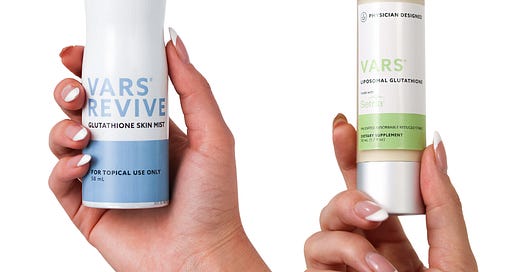Hello, followers and friends! In today's conversation, I will address some of the commonly asked questions about glutathione. So what is glutathione and what does it do? Is it a vitamin or a hormone? Let's delve into that.
The National Institutes of Health (NIH) has conducted several studies highlighting the benefits of glutathione. Glutathione is a tripeptide, which means it consists of three amino acids. Its exact classification is unclear—some consider it a hormone, others a vitamin. However, the FDA categorizes it as a supplement or vitamin. Many institutions, including the NIH, have conducted extensive research on it, revealing numerous benefits.
There is a wealth of information available, with about ten to twelve main points on glutathione's benefits. However, one challenge has been that some benefits remain undiscovered as there hasn't been a fully effective form of glutathione that has significantly helped people or achieved the claimed benefits. If you believe you have a working form of glutathione, it should meet certain criteria. It should be verifiable, absorbable, reduced, stable, and have a long shelf life, all of which make it affordable and usable for the public. It should also be orally consumable to be classified as a legal supplement.
To understand glutathione's benefits, it's helpful to compare it to another potent antioxidant—vitamin C, or ascorbic acid. Vitamin C is well known for its numerous health benefits, such as its antiviral properties, promoting blood vessel health, boosting mood, supporting bone health, and being crucial for hormone production. Just as vitamin C deficiency can lead to scurvy and death, glutathione deficiency can lead to a condition called hemolytic anemia.
Let me highlight some of the key roles of glutathione. It plays a vital part in our immune system functionality, especially in the case of cd4 and cd8 T killer cells, which are essentially the soldiers of our white blood cell army. They utilize glutathione much like a porcupine uses its quills or how a pufferfish uses its spikes, as a means of defense. It's important to note that glutathione has a sticky end, known as the sulfhydryl group, which gives it a distinct smell.
These T killer cells cover themselves with glutathione molecules, which then act as spears to attack viruses, metals, toxins, and remove them from the body, to be disposed of either through bile or renal function.
Additionally, glutathione aids enzymes called metallothioneins, which are responsible for moving metals within our bodies. A third of a metallothionein molecule is composed of glutathione, which aids in removing the sticky parts of certain metals.
According to NIH research, an absorbable and effective glutathione should offer several benefits. It should have potent antiviral properties, aiding in the combat against viruses like HIV, shingles, herpes, and Epstein-Barr virus. Interestingly, these viruses initially inhibit your body's ability to produce glutathione, as it serves as your body's primary antiviral substance.
It should also assist in the removal and detoxification of heavy metals, supporting the function of metallothioneins. As we age, our ability to produce reduced glutathione diminishes, making it a challenge in our 40s and nearly impossible by our 50s, 60s, and 70s. This is mainly due to accumulated genetic errors that interfere with glutathione production.
Glutathione should also aid in the treatment of burns, as burn injuries tend to deplete glutathione levels. It should help alleviate neuropathic pain, such as that resulting from diabetes or shingles. Glutathione, when present in adequate amounts, can dramatically reduce inflammation by removing inflammatory substances, which could be beneficial in conditions like rheumatoid arthritis.
Furthermore, maintaining high levels of glutathione can prevent cholesterol oxidation into plaque in the arteries, reducing the risk of coronary artery disease or strokes. Glutathione should also improve mental clarity, help with kidney disease by removing toxins from the nephrons and stimulating the growth of new nephrons, and, much like vitamin C, it should enhance your mood and overall well-being with consistent use.
So there you have it. The research from the NIH and other universities is promising, suggesting that glutathione can have a myriad of benefits, many of which we may not even know about yet. If you still have questions about glutathione and its potential benefits, I recommend looking up glutathione and your specific health concern on PubMed to see the related research.
Thank you for your time, I appreciate you all, and wish you health and happiness.





